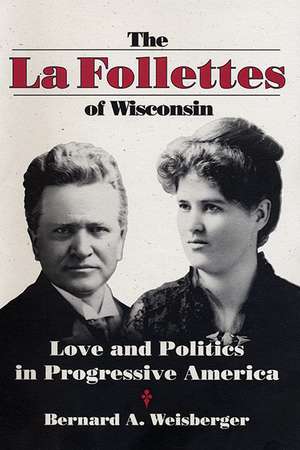The La Follettes of Wisconsin: Love and Politics in Progressive America
Autor Bernard A. Weisbergeren Limba Engleză Hardback – 14 feb 1994
Dynastic political families have been an American tradition since the birth of the Republic. Indeed, a good part of our entire political history could be written simply by setting out the family stories of the Adamses, Roosevelts, Longs, and Kennedys. To that illustrious list must be added the La Follettes of Wisconsin, and they are brought vividly to life as never before in this collective biography by veteran journalist Bernard Weisberger.
Magnetic, theatrical, intensely loved and passionately denounced, Robert Marion “Fighting Bob” La Follette was the rebel knight of the Progressive vanguard and a family patriarch in the larger-than-life tradition of Joe Kennedy. As governor of Wisconsin (1901–1906) and U.S. Senator (1906–1925) he battled uncompromisingly for his vision of democracy—an idealistic mixture of informed citizenry and enlightened public servants combining to produce a utopian egalitarianism. By contrast, the private man, often isolated and defeated by social forces beyond his understanding or control, suffered from intense periods of depression and relied heavily on his family for survival.
With his beloved wife, Belle Case La Follette, a Progressive journalist in her own right, “Old” Bob raised their brood to perceive a unique personal and family responsibility for challenging (and curing) society's ills. His first child, Fola, left her stage career to campaign for suffrage; Robert Jr. followed his father to the Senate in 1925, when he was only thirty; and in 1930 youngest son Phil became the old man's heir as Governor of Wisconsin and as the state's leading Progressive figure.
Not unlike the twentieth century's other political “first family,” however, the La Follette saga ends in largely unrealized promise and tragedy. Fola, Phil, and Bob all ultimately abandoned public life, the latter two after bitter defeat and disillusionment. Finally, in February of 1953, “young Bob” took his own life.
An intimate portrait of the Progressive movement and the revealing, poignant story of a prominent American family, The La Follettes of Wisconsin will charm, fascinate, and entertain its readers.
Magnetic, theatrical, intensely loved and passionately denounced, Robert Marion “Fighting Bob” La Follette was the rebel knight of the Progressive vanguard and a family patriarch in the larger-than-life tradition of Joe Kennedy. As governor of Wisconsin (1901–1906) and U.S. Senator (1906–1925) he battled uncompromisingly for his vision of democracy—an idealistic mixture of informed citizenry and enlightened public servants combining to produce a utopian egalitarianism. By contrast, the private man, often isolated and defeated by social forces beyond his understanding or control, suffered from intense periods of depression and relied heavily on his family for survival.
With his beloved wife, Belle Case La Follette, a Progressive journalist in her own right, “Old” Bob raised their brood to perceive a unique personal and family responsibility for challenging (and curing) society's ills. His first child, Fola, left her stage career to campaign for suffrage; Robert Jr. followed his father to the Senate in 1925, when he was only thirty; and in 1930 youngest son Phil became the old man's heir as Governor of Wisconsin and as the state's leading Progressive figure.
Not unlike the twentieth century's other political “first family,” however, the La Follette saga ends in largely unrealized promise and tragedy. Fola, Phil, and Bob all ultimately abandoned public life, the latter two after bitter defeat and disillusionment. Finally, in February of 1953, “young Bob” took his own life.
An intimate portrait of the Progressive movement and the revealing, poignant story of a prominent American family, The La Follettes of Wisconsin will charm, fascinate, and entertain its readers.
| Toate formatele și edițiile | Preț | Express |
|---|---|---|
| Paperback (1) | 234.24 lei 6-8 săpt. | |
| University of Wisconsin Press – 18 dec 2013 | 234.24 lei 6-8 săpt. | |
| Hardback (1) | 182.87 lei 3-5 săpt. | |
| University of Wisconsin Press – 14 feb 1994 | 182.87 lei 3-5 săpt. |
Preț: 182.87 lei
Nou
Puncte Express: 274
Preț estimativ în valută:
34.100€ • 36.15$ • 29.13£
34.100€ • 36.15$ • 29.13£
Carte disponibilă
Livrare economică 05-19 martie
Preluare comenzi: 021 569.72.76
Specificații
ISBN-13: 9780299141301
ISBN-10: 0299141306
Pagini: 382
Ilustrații: 24 b-w photos
Dimensiuni: 152 x 229 x 28 mm
Greutate: 0.69 kg
Ediția:1
Editura: University of Wisconsin Press
Colecția University of Wisconsin Press
ISBN-10: 0299141306
Pagini: 382
Ilustrații: 24 b-w photos
Dimensiuni: 152 x 229 x 28 mm
Greutate: 0.69 kg
Ediția:1
Editura: University of Wisconsin Press
Colecția University of Wisconsin Press
Notă biografică
Bernard A. Weisberger is currently the “In the News” columnist for American Heritage. In his distinguished career he has published seventeen books and countless articles on Americana. His television and film credentials include collaborations with Bill Moyers and Ken Burns.
Descriere
Dynastic political families have been an American tradition since the birth of the Republic. Indeed, a good part of our entire political history could be written simply by setting out the family stories of the Adamses, Roosevelts, Longs, and Kennedys. To that illustrious list must be added the La Follettes of Wisconsin, and they are brought vividly to life as never before in this collective biography by veteran journalist Bernard Weisberger.
Magnetic, theatrical, intensely loved and passionately denounced, Robert Marion “Fighting Bob” La Follette was the rebel knight of the Progressive vanguard and a family patriarch in the larger-than-life tradition of Joe Kennedy. As governor of Wisconsin (1901–1906) and U.S. Senator (1906–1925) he battled uncompromisingly for his vision of democracy—an idealistic mixture of informed citizenry and enlightened public servants combining to produce a utopian egalitarianism. By contrast, the private man, often isolated and defeated by social forces beyond his understanding or control, suffered from intense periods of depression and relied heavily on his family for survival.
With his beloved wife, Belle Case La Follette, a Progressive journalist in her own right, “Old” Bob raised their brood to perceive a unique personal and family responsibility for challenging (and curing) society's ills. His first child, Fola, left her stage career to campaign for suffrage; Robert Jr. followed his father to the Senate in 1925, when he was only thirty; and in 1930 youngest son Phil became the old man's heir as Governor of Wisconsin and as the state's leading Progressive figure.
Not unlike the twentieth century's other political “first family,” however, the La Follette saga ends in largely unrealized promise and tragedy. Fola, Phil, and Bob all ultimately abandoned public life, the latter two after bitter defeat and disillusionment. Finally, in February of 1953, “young Bob” took his own life.
An intimate portrait of the Progressive movement and the revealing, poignant story of a prominent American family, The La Follettes of Wisconsin will charm, fascinate, and entertain its readers.
Magnetic, theatrical, intensely loved and passionately denounced, Robert Marion “Fighting Bob” La Follette was the rebel knight of the Progressive vanguard and a family patriarch in the larger-than-life tradition of Joe Kennedy. As governor of Wisconsin (1901–1906) and U.S. Senator (1906–1925) he battled uncompromisingly for his vision of democracy—an idealistic mixture of informed citizenry and enlightened public servants combining to produce a utopian egalitarianism. By contrast, the private man, often isolated and defeated by social forces beyond his understanding or control, suffered from intense periods of depression and relied heavily on his family for survival.
With his beloved wife, Belle Case La Follette, a Progressive journalist in her own right, “Old” Bob raised their brood to perceive a unique personal and family responsibility for challenging (and curing) society's ills. His first child, Fola, left her stage career to campaign for suffrage; Robert Jr. followed his father to the Senate in 1925, when he was only thirty; and in 1930 youngest son Phil became the old man's heir as Governor of Wisconsin and as the state's leading Progressive figure.
Not unlike the twentieth century's other political “first family,” however, the La Follette saga ends in largely unrealized promise and tragedy. Fola, Phil, and Bob all ultimately abandoned public life, the latter two after bitter defeat and disillusionment. Finally, in February of 1953, “young Bob” took his own life.
An intimate portrait of the Progressive movement and the revealing, poignant story of a prominent American family, The La Follettes of Wisconsin will charm, fascinate, and entertain its readers.
Recenzii
"Focusing on the intense personal relationships that bound the state's first family together in the pursuit of the public good, Weisberger's account breaks fresh ground in its analysis of the origins and development of Wisconsin Progressivism and enhances our understanding of Midwestern insurgency."—James J. Lorence, Journal of American History
“Highly readable, judicious in tone, aware of the La Follettes’ limitations while insistent upon their manifest accomplishments, committed in its admiration of reform values and goals, and long overdue. Its attention to love and affection within the [La Follette] family demonstrates how important these values and relationships can be to any family, including political ones.”—John E. Miller, Reviews in American History
Cuprins
Illustrations
Preface
Acknowledgments
1. Belle and Bob (1879–1905)
2. Bob: On the Road and on the Rise (1906–1911)
3. Belle: A “New Woman” and Her Family (1891–1911)
4. Fola: From Art to Activism (1904–1911)
5. Transition Time: The Family Completed (1912–1916)
6. The Catastrophe: Alone and at Bay (1917–1919)
7. In Another Country: Old Bob’s Last Campaigns (1919–1925)
8. The Succession That Wasn’t (1925–1941)
Epilogue: The War and After
Notes
Bibliography
Index










